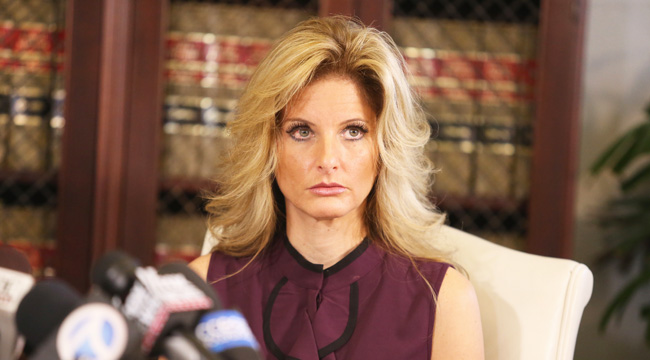
President Trump believes he should not be subject to a defamation lawsuit (from a woman who accused him of groping her) while he’s president, and his lawyer (Marc Kasowitz) is ready to argue that point in court. Trump is currently being sued by Summer Zervos, an ex-Apprentice contestant who accused Trump of sexual harassment. She also filed a defamation lawsuit against him while alleging that the President’s decision to call her a liar ruined her reputation and put her livelihood in danger.
The court case was first filed in January — a few months after Trump denied Zervos’ allegations that he tried to kiss her twice and then attacked her in a hotel room in 2007. He also very publicly pushed back. Around the time that Zervos made her allegations, he tweeted that he was losing women voters because of “made up events THAT NEVER HAPPENED.” The president believes such a case will only distract him from his presidential duties and hurt the nation, so he’s citing the Supremacy Clause and hoping it will get him off the hook. For now at least, according to the Hollywood Reporter.
In other words, his lawyer will argue that the needs of the federal government are to be put in front of any state court case, and dragging a sitting president through a civil trial would only have a negative impact on his ability to govern. By doing this, Kasocwitz will try to use an argument that Bill Clinton’s lawyer’s failed to use successfully when former President Clinton was sued for sexual harassment in Clinton v. Jones. At the time, the Supreme Court ruled that the Supremacy Clause, which gives the federal government broad national powers, does not require that federal courts delay all private civil lawsuits against a sitting president.
Still, Kasocwitz notes that “crucial threshold issue was raised, but not decided, by the U.S. Supreme Court in Clinton v. Jones.” He’s asking the court to at least treat his client’s court case the same way they treated Clinton v. Jones and resolve the issue of immunity before proceeding any further.
Zervos’ lawyer, Gloria Allred, has only agreed to a 30-day extension: “We look forward to arguing this issue in court.”
(via Hollywood Reporter, The Hill & Law.Cornell.Edu)
